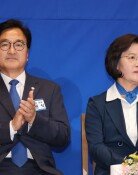[Opinion] Naming Policies
Many people think that a good name determines their fate. As the process of changing ones name has become easier since last November, the number of applications for changing a name, received at a court, recently exceeded 10,000 a month. While some try to change their name to avoid being ridiculed because of a funny name, there are a lot of people who try to change their name to alter their fate. However, Jeong Myung-kuk (51 Seoul), who studied name making for over 30 years, advised, A name serves as one of the many factors that affect ones fate, so you should be careful not to be fooled by a sham name-maker.
These days, each government department is busying giving a good name to their policies. One example is that Cheong Wa Dae labeled seven places where housing prices surged as Bubble Seven. Bubble means that the boom will bust one day, therefore the labeling evinces antipathy against those areas. The Ministry of Commerce, Industry and Energy named an energy conservation campaign as The 3,6,9 movement, which means three things which one can carry out right away, six items which one can put into action, if interested, and nine, including all of them that one should practice extensively. They say that if this campaign succeeds, 2.6 trillion dollars worth of energy could be saved yearly.
The Ministry of Health and Welfare decided to call a low-birthrate counterplan the two two plan to the effect that a couple should have a least two children. The Ministry of Finance and Economy decided to invite the public in naming its policy, the earned income tax credit (EITC), a refundable tax credit for low-income workers, with easy words, as the EITC is too difficult. However, from the receivers viewpoint, the difficult name, EITC might hurt their pride less.
Under the Kim Young-sam administration, major economic policies, such as the New economy 100 day plan and New economy five-year plan were always added with the word new economy. However, bringing shame to the name, Korea was hit hard by the financial crisis. The Kim Dae-jung administration came up with a policy named, New intellectual pioneers. That was supposed to mean that regardless of academic background, people who succeeded with their own unique knowledge and technology should be recognized and respected as new intellectual pioneers, but the policy was criticized for distorting the image of intellectual figures. If a life and a policy, as well, are evaluated with their outcomes, then the government should try its best to fill good content in its policies rather than focus on making their names. No use of spending tax on naming policies.
Lim Gyu-jin, Editorial Writer, mhjh22@donga.com







